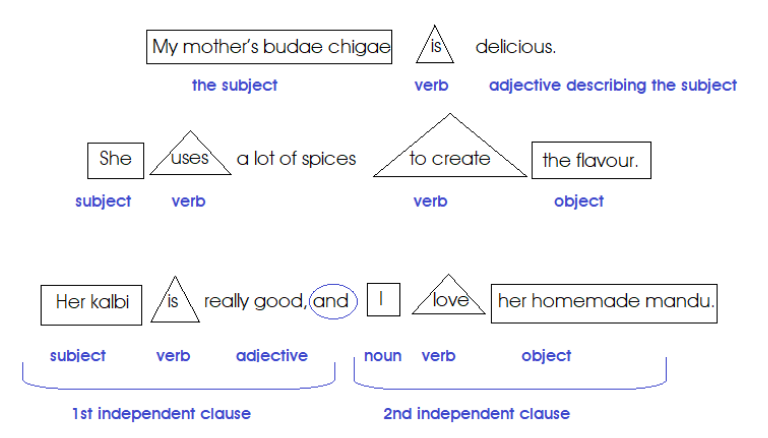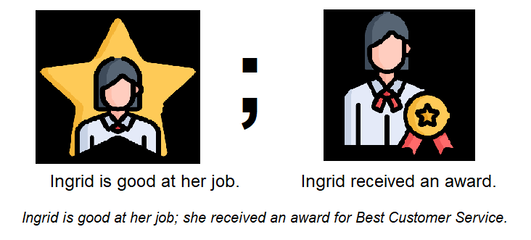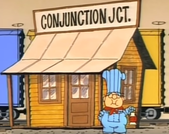1.5 compound sentences
Before beginning the examples and exercises, please watch the Explanation Video below.
E1 - Explanation
There are seven useful ways to join independent clauses (simple sentences) to make more interesting, or compound, sentences. You can use the acronym FANBOYS (For, And, Nor, But, Or, Yet, So) to help you remember these seven words, which are called coordinating conjunctions. ‘Coordinate’ means to match, while ‘junction’ means to join, connect, or intersect.
E2 - Examples
Simple sentence: My mother’s budae chigae is delicious.
Independent clause: She uses a lot of spices to create the flavour.
Compound sentence: Her kalbi is really good, and I love her homemade mandu.
Independent clause: She uses a lot of spices to create the flavour.
Compound sentence: Her kalbi is really good, and I love her homemade mandu.
To help distinguish the parts of speech, we will generally use rectangles for nouns, triangles for verbs, and ovals for adjectives. In the image above, the blue circle indicates the conjunction ‘and’ which joins the two independent clauses - each of which could be separate simple sentences. Joined with a conjunction, they become one compound sentence.
For - Explains reason or purpose
( note: this is an old-fashioned and formal style: "because" is the modern equivalent)
I will never leave you, for I love you truly.
And - Adds one thing to another
Add the hot water to the ramen, and add the spice packet last.
Nor - Used to present an alternative negative idea with an already stated negative idea
He does not have a good attitude, nor does he have good study habits.
But - Shows contrast
We wanted to buy a red car, but the dealer only had blue and silver.
Or - Presents an alternative or a choice
You can have pork cutlet at the student cafeteria today,
or you can have fish and chips at the faculty cafeteria.
Yet - Introduces a contrasting idea that follows the preceding idea logically
( note: this is an old-fashioned and formal style: "but" is the modern equivalent)
Switzerland is a small country, yet it has a great deal of tourism.
So - Indicates effect, result or consequence
Jessica didn’t read the contract carefully, so she had to pay more than she expected.
For - Explains reason or purpose
( note: this is an old-fashioned and formal style: "because" is the modern equivalent)
I will never leave you, for I love you truly.
And - Adds one thing to another
Add the hot water to the ramen, and add the spice packet last.
Nor - Used to present an alternative negative idea with an already stated negative idea
He does not have a good attitude, nor does he have good study habits.
But - Shows contrast
We wanted to buy a red car, but the dealer only had blue and silver.
Or - Presents an alternative or a choice
You can have pork cutlet at the student cafeteria today,
or you can have fish and chips at the faculty cafeteria.
Yet - Introduces a contrasting idea that follows the preceding idea logically
( note: this is an old-fashioned and formal style: "but" is the modern equivalent)
Switzerland is a small country, yet it has a great deal of tourism.
So - Indicates effect, result or consequence
Jessica didn’t read the contract carefully, so she had to pay more than she expected.
E3 - Exercises
1.5A Choose the best coordinating conjunction for each compound sentence.
or for and so nor but yet
1.5B Write five compound sentences, using any of the subjects, verbs, and objects provided below, and combining them however you like. You must make sure the verbs agree with their subjects. You may change the tense. You may use extra details and the bonus adjectives to create interesting sentences. Answers will vary.
or for and so nor but yet
- Renea had no baking powder, ______ she went to the store.
- Hongbu is a farmer, _____ Nolbu is a farmer.
- She didn’t pass math class, ______ did she pass music class.
- I can’t sing, ____ my friends insist on taking me to the noraebang!
- He loves her, _______ she is both intelligent and kind.
- Should we buy bananas, _______ should we buy apples at the market?
- I know you feel sad, ____ remember that you are not alone.
1.5B Write five compound sentences, using any of the subjects, verbs, and objects provided below, and combining them however you like. You must make sure the verbs agree with their subjects. You may change the tense. You may use extra details and the bonus adjectives to create interesting sentences. Answers will vary.
1. __________________________________________________________________
2. __________________________________________________________________
3. __________________________________________________________________
4. __________________________________________________________________
5. __________________________________________________________________
Subjects: Dr. Yoon / English / my car / Seoul / her new computer / I / Paris / Mrs. Smith / we / his mother / the horse / Bob / the medium latte
Verbs: work / be / have / buy / go / help / travel / break / paint / use / eat / drink / choose / sleep
Objects: the office / a textbook / homework / the garage / South Korea / the KTX / watercolours / school / kimchi chigae / our hometown / Starbucks / Eun-mi / TV
Coordinating Conjunctions: for and nor but or yet so
Adjectives (bonus!): healthy / beautiful / difficult / annoying / fantastic / helpful / busy / delicious
REMEMBER:
To create compound sentences, you may combine independent clauses with any of the seven coordinating conjunctions (FANBOYS) found in English. (Review independent clauses in Lesson 1.4!)
OR:
To create compound sentences, you may also simply join two independent clauses with a semicolon (;).
Do not use a conjunction if you use a semicolon. This is also a good way to make more interesting sentences!
Petros had studied taekwondo for five years; Lucia had studied for ten.
The first lion-tiger mix in South Korea was born at Everland; he was named Chris the Liger.
The Valentine’s Day box was disappointing; all the chocolates were stale.
Close the door when you come in; we can’t waste money heating all outdoors!
To create compound sentences, you may combine independent clauses with any of the seven coordinating conjunctions (FANBOYS) found in English. (Review independent clauses in Lesson 1.4!)
OR:
To create compound sentences, you may also simply join two independent clauses with a semicolon (;).
Do not use a conjunction if you use a semicolon. This is also a good way to make more interesting sentences!
Petros had studied taekwondo for five years; Lucia had studied for ten.
The first lion-tiger mix in South Korea was born at Everland; he was named Chris the Liger.
The Valentine’s Day box was disappointing; all the chocolates were stale.
Close the door when you come in; we can’t waste money heating all outdoors!
E4 - Expansion
The distinction between English conjunctions, including an excellent graphic, can be found here.
The distinction between English conjunctions, including an excellent graphic, can be found here.
E5 - External Links
|
The original famous Schoolhouse Rock video, Conjunction Junction, can be found here. An ESL version with white text on a plain black background can be found here. |
|
Monkey Isle is a simple game which allows students to choose the correct conjunction and fit it into a sentence. It has animation and voice-over to read the sentences, and provides instant scoring (but not feedback) for answers.
|







